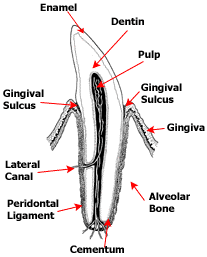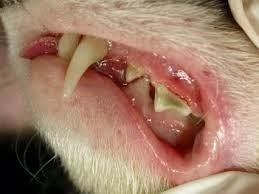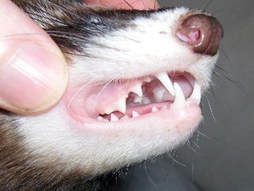
Ferret Dentistry: Something to Sink Your Teeth Into
Kristin Claricoates, DVM; Chicago Exotics Animal Hospital
Have you ever heard of doing a dental on a ferret? “Why would ferret teeth need cleaning?” “People brush a ferret’s teeth?!?” These are all comments we have heard regularly from our clients at Chicago Exotics Animal Hospital. For many people who have never heard of dental cleanings on a pet ferret it can seem very strange that they need cleaning too. It is our goal at Chicago Exotics Animal Hospital to make you aware of ferret dentistry and all the unique things that make ferret teeth special to them. You can share your new expertise with your ferret owner friends and wow them! To fully understand why ferrets need dental cleanings routinely, it’s best to learn about ferret teeth first.
When ferrets are young, they have 30 teeth and as adults they have 34 teeth. These 30 baby teeth are all present at about 3 months of age, and by 9 months of age all adult teeth should be present. You may have noticed some of their teeth look so different from one another. There are four types of teeth in a ferret: the incisors, canines, premolars, and molars. We, as humans, have each of these tooth types as well, although in different numbers. The incisors, are the teeth in the front of the mouth. They are used to pick up and gather food into the mouth. The canine teeth are sharp needle-like teeth (see picture below) which are used to puncture food and tear it. There are premolars which shear and cut food. Molars are utilized to grind food up to be digested and are the farthest back in the mouth. Ferrets, like cats, dogs, and humans have teeth that stop growing. There is enamel over the teeth and a chamber in the middle of the tooth in which there is a blood supply and a nerve supply, called the pulp. The tooth is held in place to the gums (or gingival) by cementum and a periodontal ligament.
Normal ferret canine tooth
Image Source: http://www.peteducation.com/article.cfm?c=11+2077&aid=325
Like us, a ferret can crack or chip their teeth. These fractures often happen because of fighting or trauma from chewing on very hard items such as bone or cage bars. Sometimes these “chips” can occur where only the enamel is lost. If this occurs, it may not be a problem and may not need orthodontic repair, but it is important for Chicago Exotics to double check. At other times, the tooth breaks in such a way that the chamber in the middle of the tooth is exposed. If that chamber is exposed, bacteria can get into the blood supply which is rich in nutrients. Because the nerve is in this chamber as well, it is painful to have an exposed root. In humans if this occurs, we know right away and so a root canal is performed. If we notice this right away in your pets, a root canal can be performed at clinics equipped for dental surgery. However, in pets it may not be noticed for months. As a result, bacteria enter the tooth and can cause an abscess (an infection of the tooth and tooth root). If this occurs, we recommend removing the tooth.
“How about braces in people? Surely ferrets don’t need those?” While ferrets do need orthodontic work sometimes traditional braces are not an option for ferrets. When ferret teeth point in abnormal directions, it results in trauma to the gums and/ or roof of the mouth, or creates problems for other teeth in the mouth. There are many creative ways Chicago Exotics Animal Hospital can try to fix these problems.
The most common problem that ferrets experience related to teeth is periodontal disease- the buildup of plaque and calculus on the teeth causing irritation of the gumline. In ferrets, a dental cleaning is recommended on an annual basis. Brushing the teeth at home on a daily or even weekly (at minimum) basis helps prevent plaque and tartar buildup. Cat and dog toothpaste is safe for ferret use. If periodontal disease becomes particularly bad, the attachments that keep the tooth in place begin to erode and the tooth may loosen, and the roots of the tooth become exposed. At that point removing that tooth may be needed. “Why not leave the tooth instead of extracting it?” A loose tooth is uncomfortable for your pet. It is also a way that bacteria can enter the blood supply of the tooth and the blood stream where it can spread to other parts of the body. This can be a dangerous situation as the bacteria can be deposited and grow in places like the heart and kidneys creating a potentially life-threatening situation.
Sometimes, owners believe ferrets need their teeth trimmed. While this is true in rabbits and rodents, it is not true for a ferret. Ferrets have a different type of tooth structure. A ferret has anelodont (limited period of growth), and brachydont (short crowned) teeth. This is in direct contrast with the elodont, or continuously growing teeth, that do not develop anatomical roots and are present in rabbits. This is why rabbits have their teeth trimmed and ferrets do not. If your ferret's teeth have been trimmed in the past, consult with Chicago Exotics to determine the level of damage, and if the tooth can be saved.
Annual dental examinations and cleanings are recommended. “What can I do for my ferret at home?” Brushing your ferret’s teeth daily using a toothbrush designed for a cat works very well! Work on cleaning the outsides of the teeth, where tartar builds up the most. Brush slowly and gently. Tooth brushing is a great way to prevent tartar from eventually building up and causing inflammation along the gumline. Avoid feeding your ferret soft foods or sugary treats to help reduce tartar buildup. Additionally, Maxiguard gel is a helpful product to prevent dental disease. It reduces bad breath by killing the microbes present which create plaques and bad odor. Even with these two home prevention steps, it is natural that tartar will build up. An annual cleaning at Chicago Exotics will remove anything you can’t at home!
September is ferret dental month at Chicago Exotics! Call to ask for more information at 847-329-8709.
Works Cited:
Bellows, Jan. "01 Ferret Dentistry - VeterinaryPartner.com - a VIN Company!" 01 Ferret Dentistry - VeterinaryPartner.com - a VIN Company! VIN, 27 June 2002. Web. 06 Feb. 2015.
Bellows, Jan. "Ferret Dentistry." Ferret Dentistry. All Pets Dental Clinic, 31 Oct. 2000. Web. 06 Feb. 2015.
Hines, Ron. "Caring For Your Ferret 's Teeth - Tooth Problems In Ferrets."Caring For Your Ferret 's Teeth - Tooth Problems In Ferrets. 2nd Chance, n.d. Web. 06 Feb. 2015.
Kristin Claricoates, DVM; Chicago Exotics Animal Hospital
Have you ever heard of doing a dental on a ferret? “Why would ferret teeth need cleaning?” “People brush a ferret’s teeth?!?” These are all comments we have heard regularly from our clients at Chicago Exotics Animal Hospital. For many people who have never heard of dental cleanings on a pet ferret it can seem very strange that they need cleaning too. It is our goal at Chicago Exotics Animal Hospital to make you aware of ferret dentistry and all the unique things that make ferret teeth special to them. You can share your new expertise with your ferret owner friends and wow them! To fully understand why ferrets need dental cleanings routinely, it’s best to learn about ferret teeth first.
When ferrets are young, they have 30 teeth and as adults they have 34 teeth. These 30 baby teeth are all present at about 3 months of age, and by 9 months of age all adult teeth should be present. You may have noticed some of their teeth look so different from one another. There are four types of teeth in a ferret: the incisors, canines, premolars, and molars. We, as humans, have each of these tooth types as well, although in different numbers. The incisors, are the teeth in the front of the mouth. They are used to pick up and gather food into the mouth. The canine teeth are sharp needle-like teeth (see picture below) which are used to puncture food and tear it. There are premolars which shear and cut food. Molars are utilized to grind food up to be digested and are the farthest back in the mouth. Ferrets, like cats, dogs, and humans have teeth that stop growing. There is enamel over the teeth and a chamber in the middle of the tooth in which there is a blood supply and a nerve supply, called the pulp. The tooth is held in place to the gums (or gingival) by cementum and a periodontal ligament.
Normal ferret canine tooth
Image Source: http://www.peteducation.com/article.cfm?c=11+2077&aid=325
Like us, a ferret can crack or chip their teeth. These fractures often happen because of fighting or trauma from chewing on very hard items such as bone or cage bars. Sometimes these “chips” can occur where only the enamel is lost. If this occurs, it may not be a problem and may not need orthodontic repair, but it is important for Chicago Exotics to double check. At other times, the tooth breaks in such a way that the chamber in the middle of the tooth is exposed. If that chamber is exposed, bacteria can get into the blood supply which is rich in nutrients. Because the nerve is in this chamber as well, it is painful to have an exposed root. In humans if this occurs, we know right away and so a root canal is performed. If we notice this right away in your pets, a root canal can be performed at clinics equipped for dental surgery. However, in pets it may not be noticed for months. As a result, bacteria enter the tooth and can cause an abscess (an infection of the tooth and tooth root). If this occurs, we recommend removing the tooth.
“How about braces in people? Surely ferrets don’t need those?” While ferrets do need orthodontic work sometimes traditional braces are not an option for ferrets. When ferret teeth point in abnormal directions, it results in trauma to the gums and/ or roof of the mouth, or creates problems for other teeth in the mouth. There are many creative ways Chicago Exotics Animal Hospital can try to fix these problems.
The most common problem that ferrets experience related to teeth is periodontal disease- the buildup of plaque and calculus on the teeth causing irritation of the gumline. In ferrets, a dental cleaning is recommended on an annual basis. Brushing the teeth at home on a daily or even weekly (at minimum) basis helps prevent plaque and tartar buildup. Cat and dog toothpaste is safe for ferret use. If periodontal disease becomes particularly bad, the attachments that keep the tooth in place begin to erode and the tooth may loosen, and the roots of the tooth become exposed. At that point removing that tooth may be needed. “Why not leave the tooth instead of extracting it?” A loose tooth is uncomfortable for your pet. It is also a way that bacteria can enter the blood supply of the tooth and the blood stream where it can spread to other parts of the body. This can be a dangerous situation as the bacteria can be deposited and grow in places like the heart and kidneys creating a potentially life-threatening situation.
Sometimes, owners believe ferrets need their teeth trimmed. While this is true in rabbits and rodents, it is not true for a ferret. Ferrets have a different type of tooth structure. A ferret has anelodont (limited period of growth), and brachydont (short crowned) teeth. This is in direct contrast with the elodont, or continuously growing teeth, that do not develop anatomical roots and are present in rabbits. This is why rabbits have their teeth trimmed and ferrets do not. If your ferret's teeth have been trimmed in the past, consult with Chicago Exotics to determine the level of damage, and if the tooth can be saved.
Annual dental examinations and cleanings are recommended. “What can I do for my ferret at home?” Brushing your ferret’s teeth daily using a toothbrush designed for a cat works very well! Work on cleaning the outsides of the teeth, where tartar builds up the most. Brush slowly and gently. Tooth brushing is a great way to prevent tartar from eventually building up and causing inflammation along the gumline. Avoid feeding your ferret soft foods or sugary treats to help reduce tartar buildup. Additionally, Maxiguard gel is a helpful product to prevent dental disease. It reduces bad breath by killing the microbes present which create plaques and bad odor. Even with these two home prevention steps, it is natural that tartar will build up. An annual cleaning at Chicago Exotics will remove anything you can’t at home!
September is ferret dental month at Chicago Exotics! Call to ask for more information at 847-329-8709.
Works Cited:
Bellows, Jan. "01 Ferret Dentistry - VeterinaryPartner.com - a VIN Company!" 01 Ferret Dentistry - VeterinaryPartner.com - a VIN Company! VIN, 27 June 2002. Web. 06 Feb. 2015.
Bellows, Jan. "Ferret Dentistry." Ferret Dentistry. All Pets Dental Clinic, 31 Oct. 2000. Web. 06 Feb. 2015.
Hines, Ron. "Caring For Your Ferret 's Teeth - Tooth Problems In Ferrets."Caring For Your Ferret 's Teeth - Tooth Problems In Ferrets. 2nd Chance, n.d. Web. 06 Feb. 2015.



